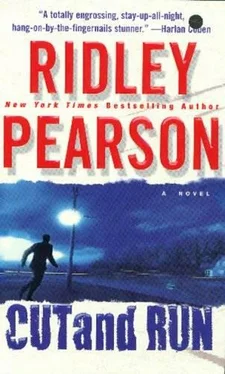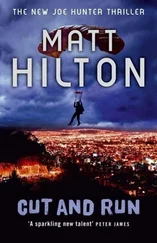Only then did it occur to him to check his BlackBerry-silent for the past hour except for his failed outgoing calls-only to realize he’d never turned the ringer back on.
The icons showed he had seven e-mails and two voice messages waiting.
Behind the wheel now, he called his voice mail. Hearing Tomelson’s voice was like stopping time.
Larson, it’s Tommy. Listen, there’s someone nosing around here at the hotel, and I don’t like it. I’m going to relocate the package in a little Halloween costume of her own. Call me.
He deleted the message. An automated woman’s voice said, “Second message…”
Lars… It’s me.
She sounded out of breath, frightened.
Something’s happened. To your friend, I mean. It was horrible. Whatever you do, don’t go to the hotel. I’m in a bar. It’s a restaurant called Temptation. Green and white, across from a bike rental place. I’ll stay here…
Her voice paused. He could feel her checking her watch or a clock.
… an hour at most. After that, I’m not sure. Call me, or come by.
She paused.
Hurry.
“To delete this message, press seven. To save it, press nine. To reply…”
Larson disconnected the call, checked the BlackBerry’s message area and saw the two missed calls, the second of which had been made fifty minutes earlier when he’d still been on Tomelson’s charter boat. He kicked himself for having left the ringer off.
He called her back as he drove around the tiny village looking for the bike rental place or a green and white awning. This time she answered. They were barely into their conversation by the time he caught up to her outside the restaurant.
She climbed inside. Able to let down the front for the first time in hours, she nearly collapsed. “It’s all my fault. I blew it. Miller warned me they could trace me. But I wanted to-”
“Miller?”
“Find somewhere to pull over. We’ve got to talk.”
Larson drove straight to the public beach. Hope told him about her brief connection with Markowitz through Miller, and Miller’s detection of the electronic ping that quickly identified her. She detailed Tomelson’s actions in the hotel room. Larson explained the shooting on Useppa, and the setback it dealt them. He indicated the laptop computer at her feet, and Hope got to work as they talked.
“His family should have told us about the grandson,” Larson said. “That explains so much.”
“Markowitz, dead?” She mulled this over, Penny’s life in the wind. “He would have kept a disk, a backup of some sort.”
“I looked around. Didn’t see anything. Patted him down, thinking it might be a USB disk I’m looking for. Nothing. So I took the laptop.”
“The list will be on the hard drive.” She had the computer running now. “Though in and of itself, that doesn’t help us much.”
“It may help others.” Larson wondered about a system that placed the innocent in hiding from killers who remained in open society, the twisted logic in that, and his own willing participation in its perpetuation. Now his flesh and blood was a part of it, and this seemed to him penance for his failure to question the moral authority of such a practice. He’d so readily focused on Hope, and then Penny, that only now did the full importance of stopping the sale of Laena hit him. There were not simply tens or even hundreds of Pennys out there, but thousands. Many had hopefully heeded the alarm as Hope had and were now well away from their homes, harder to find. Hundreds? Thousands? But even these still carried an assumed name, and those names were on that list, on credit cards, checks, bank accounts, vehicle registrations, school enrollments. How many would have the wherewithal to drop all that like a stone? How many of the thousands had never seen or heard the alarm? How many were still at risk?
“If you’re the Romeros,” Larson speculated, “and you’ve hidden this old guy away on a remote island with virtually no access, but therefore no escape route either, what protections do you take to make sure someone like me doesn’t walk away with the list?”
She thought about it. “If I’m the one in charge, I’d want to see daily progress. And I don’t want the only copy of that list in his possession.”
“Exactly.”
Hope suddenly understood. “Follow the e-mail! Markowitz e-mailed the newest part of the decrypted list each morning.”
Her fingers were typing furiously now. The light from the screen washed her face.
“And you’re not going to trust something as important as Laena with a surrogate,” Larson said. “Not when it’s worth tens of millions of dollars. It’s got to be e-mailed directly to you. To the Romeros.”
“Follow the e-mail,” she repeated. Her hands paused above the keyboard. “Shit!”
Larson glanced over at her, then back into the darkness of the beach.
“You said there was a techie there with him.”
“That’s how it looked,” Larson told her. “A young guy. Nerdy. I can’t say for sure.”
“Well, this thing’s clean,” she said, slapping the laptop. “That guy’s job apparently was not only to monitor Markowitz’s progress, but to wipe the files… to reduce the chance of Laena or those e-mails being lifted if someone like you did come along.”
With her finger she drew a line in the condensation on the inside of the car’s glass. An old lighthouse at the end of the parking lot threw a dim beacon out to sea, swiping their faces with each pass. She disappeared from him between the pulses.
“So we’re screwed?”
“No way to tell yet,” she said. “His e-mails aren’t on this machine. He must have erased them as he went. His mail is hosted on a server-another way to reduce the security risk if the laptop was taken. The deleted information may still be on here somewhere, but it will take days, weeks, to drill down in and find it.”
“Then we are screwed.”
“Now wait,” she said, as if talking to Penny. “The e-mails would have gone through the same connection. Through the university’s grid. Miller’s network. That’s what Markowitz was telling me about following the e-mails. They leave a digital ID at each phase of transmission. There’s no way to completely erase an e-mail once it’s sent. It sticks to every server and relay it touches.”
“So Miller can help us.” Larson started the car, a sense of purpose finding him again.
“He read the exchange between me and Markowitz.” She turned her face into the sweep of white light. “My guess is: a guy like him? He’s already on it.”
His right eye had not improved. If anything, it seemed to Penny to have gotten worse. He kept it covered most of the time, and because of this, whenever he turned his head to check the truck’s driver’s-side mirror he had no sight of the back berth, no sight of her whatsoever. They passed a sign welcoming them to Colorado.
Penny had discerned a pattern. The monster (which is what she called him, ever since he’d killed the poor man who owned this truck) was tired and playing games with his left eye, his one good eye, in order to stay awake. First he looked out the passenger window into the truck’s right-hand mirror; then, out the windshield; then out the driver’s-side mirror. He returned his attention to the highway for another couple of minutes and then started the pattern all over again. Always the same.
He’d put her onto the comfortable bed in the back, ankles and wrists taped together, but no gag for most of the day. She appreciated having the gag off and didn’t say a word, knowing if she did, he’d put it back on. He’d dragged the dead man into some bushes alongside a deserted road well off the highway, late, late at night. She tried her best to forget about that.
Читать дальше












